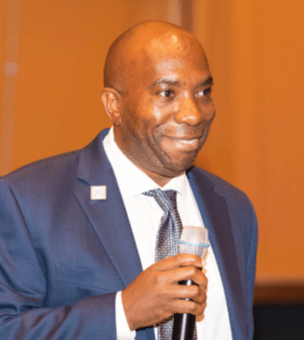882. A Day in the Life: What's It Really Like to Be a Mathematician or Statistician?
Edray Herber Goins

“What I would love to do in the next 10 years or so is focus very much on getting underrepresented minorities in general and African Americans in particular, more interested in mathematics. I personally love math and I want as many people as I can to take as many math classes as they can. I know that there are a lot of underrepresented minorities that are very nervous about questions such as: What kind of career could I have in math? Might I make more money being an engineer or a doctor? What are some of the specific career opportunities I might have? And I definitely want to spend time explaining what those opportunities are and much more.”
Edray Herber Goins is Professor of Mathematics at Pomona College. He has worked as a researcher at both Harvard and the National Security Agency, and has taught at both Caltech and Purdue. Professor Goins has published over 20 journal articles in areas such as applied mathematics, graph theory, number theory, and representation theory and on topics such as Diophantine equations, elliptic curves, and African Americans in mathematics. He has acted as a referee for 20 different journals in mathematics, served on dozens of panels for the National Science Foundation, and has given more than 150 invited addresses on his research.
The Most Impactful Turning Point?
“I was never interested in mathematics as a young boy. At one point my mom had to get me a tutor because I was having a really difficult time. It wasn’t until I was in high school that I actually had a teacher that could see that I was really good at math. I was feeling bad because in high school I was behind most of my friends—they were taking calculus in their 11th grade year and I was still taking algebra and trigonometry. But my teacher for that class could see that I was really good, and he’s actually the one that encouraged me to place into the second year calculus class. So I skipped all of the first year of calculus and went straight into the second year. That’s when I realized that I really liked doing mathematics and had a talent for it. I mean, I realized that it comes down to the stereotypical story that it’s the one teacher that convinces you that you are really good at math. For me that was definitely the case.”
The Most Powerful Lessons and Experiences?
1. Going to the California Institute of Technology (Caltech) my whole world completely opened up to ideas that I had never thought of before. We weren’t just reading books about black holes and about what was happening in string theory and other fancy topics you might see on PBS documentaries. The people who had invented those ideas were there—they were teaching your classes.
2. My physics professor at Caltech knew that I was unsure about whether I wanted to get my Phd in physics or mathematics. He had his degree from Stanford and knew a Nobel Prize winning professor there who had also majored in physics at Caltech and could be an excellent advisor for me. Stanford’s math department was rated one of the top 5 Phd programs in the country. Picking Stanford was one of the best decisions I ever made.
3. I was fortunate that in graduate school I had a fellowship that was partially funded by NASA (The National Security Agency). For the first two summers in grad school I worked there, and learned what a mathematician really does. I got to work with brilliant mathematicians who were creating patents and figuring out how the endless combinations of algorithms work. It was fascinating and great fun and made me realize I really wanted to be a professor.
4. Interestingly one of the best places to learn more about this field is via YouTube. There are countless experts there sharing their experiences and insights about this field from perspectives that are often not taught in the classroom. My friend, Dr. Dave Kung, from the St. Marys College is one of those.
5. Students can also learn about other applications in many other fields by talking to their professors outside of the classroom and there are many clubs or groups that offer venues for that to easily happen.
Trade Association
The National Association of Mathematicians
https://www.nam-math.org/
Connecting With Edray Herber Goins
Website: pomona.edu/directory/people/edray-goins
Facebook: facebook.com/ehgoins
Twitter: twitter.com/edraygoins
LinkedIn: linkedin.com/in/edray-goins-88b0882/
Subscribe to the Podcast Free:
Careers: Mathematician, Professor, Statistician


